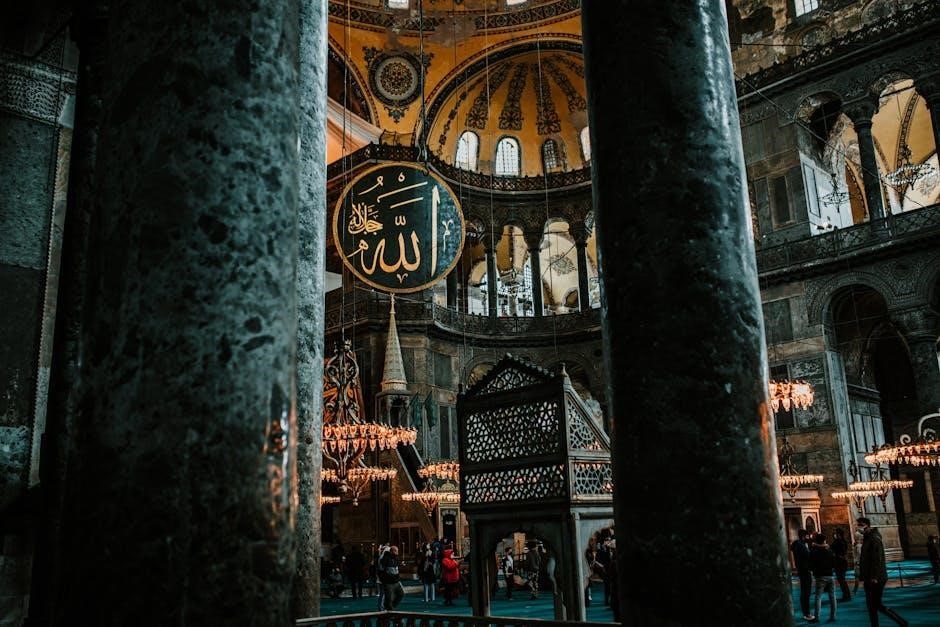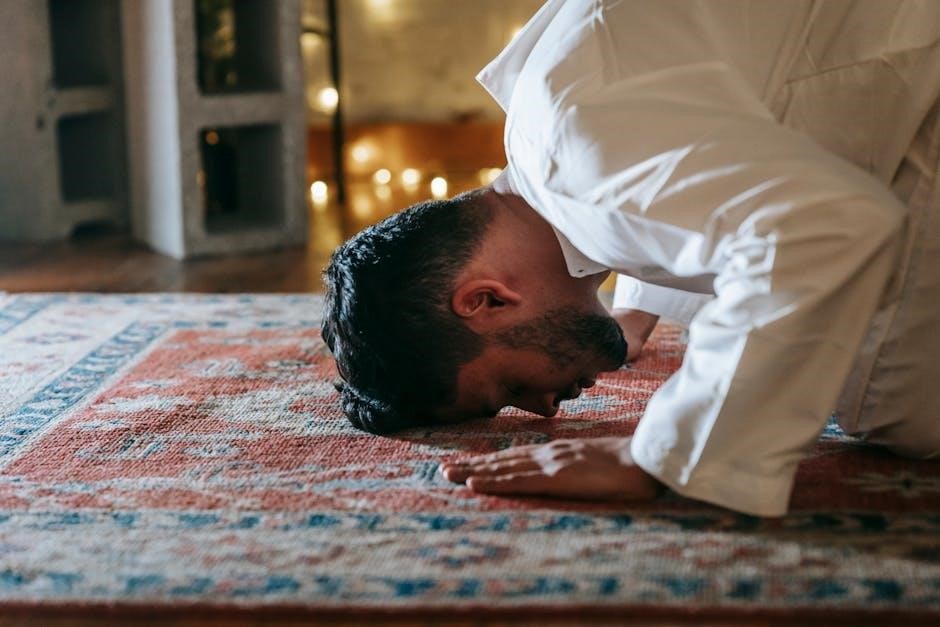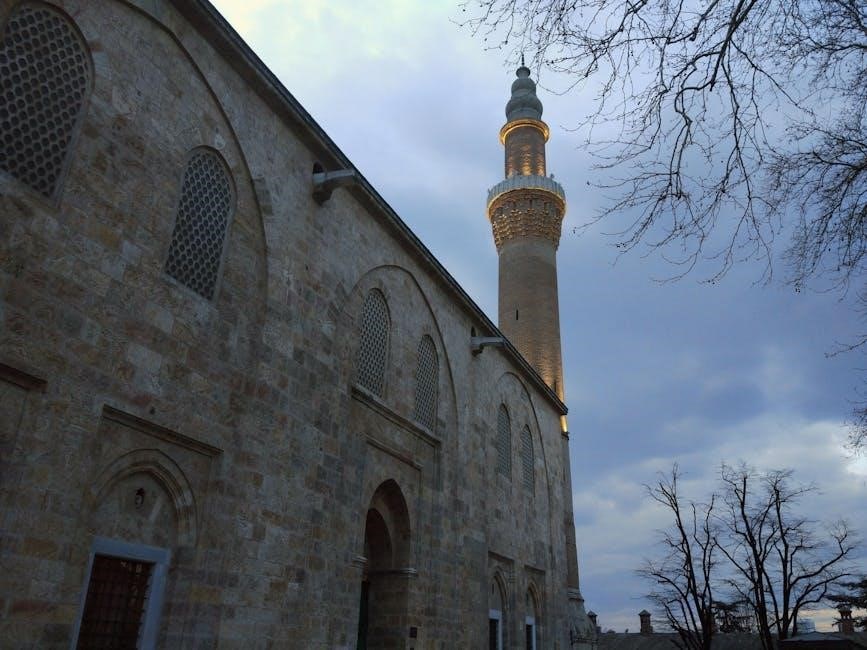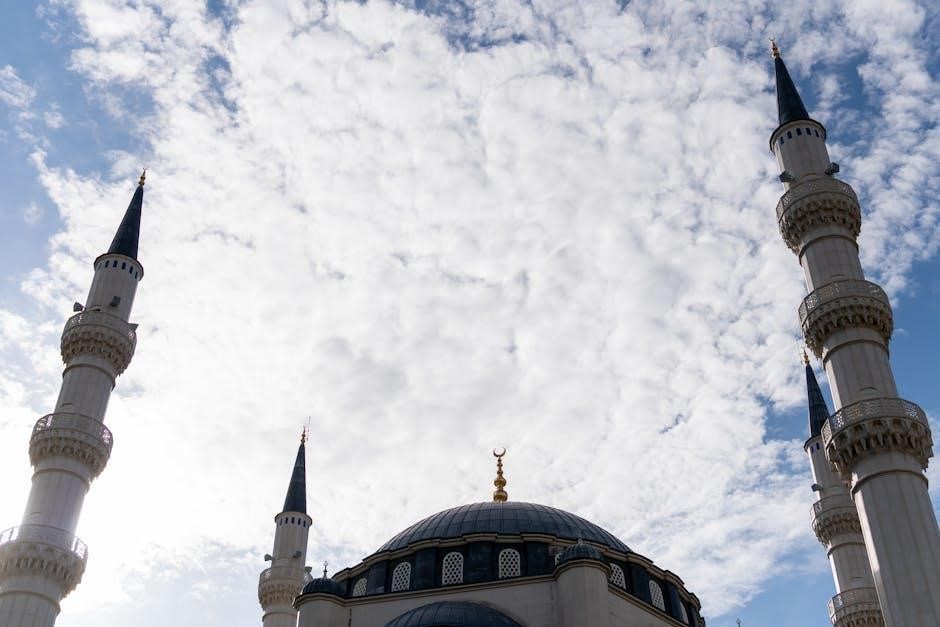Welcome to this beginner’s guide on how to pray in Islam. This comprehensive resource will help you understand the essential steps, intentions, and spiritual significance of Salah, making it easier to connect with Allah.
Significance of Prayer in Islam
Prayer, or Salah, is a fundamental pillar of Islam, holding immense spiritual and practical significance. It fosters a direct connection with Allah, serving as a means of worship, gratitude, and seeking guidance. Salah strengthens faith, provides emotional comfort, and promotes self-discipline. It is not just a ritual but a way to cultivate mindfulness and humility. The Prophet Muhammad (peace be upon him) emphasized that prayer brings tranquility to the heart, saying, “The coolness of my eyes is in prayer;” Regular prayer helps believers align their lives with Islamic values and attain inner peace.
Who Should Read This Guide
This guide is designed for newcomers to Islam, individuals seeking to deepen their understanding of Salah, and anyone looking to improve their prayer technique. It is particularly beneficial for non-Arabic speakers who wish to learn the basics of Islamic prayer. Whether you’re just starting your spiritual journey or aiming to refine your practice, this resource provides clear, step-by-step instructions to help you perform Salah with confidence and sincerity.
Preparing for Prayer
Preparing for prayer involves both mental and physical readiness. Perform wudu (ablution) to ensure cleanliness, wear modest attire, and choose a quiet, clean space for prayer. This foundational step helps you focus on your worship with sincerity and mindfulness.
Understanding the Importance of Cleanliness
Cleanliness is a fundamental aspect of prayer in Islam. It ensures both physical purity and spiritual readiness. Perform wudu (ablution) to cleanse specific body parts, such as the face, hands, and feet, before prayer. This act symbolizes purification and prepares the heart for worship. Cleanliness also extends to wearing clean attire and praying in a tidy environment; Maintaining hygiene reflects respect for Allah and enhances the sincerity of your prayer, making it more acceptable and meaningful.

Wearing Appropriate Attire
Wearing appropriate attire for prayer is essential to maintain modesty and dignity. Men should cover their bodies from navel to knee and wear clean, respectful clothing. Women must cover their entire body except the face and hands, using loose-fitting garments. Ensure fabrics are permissible, avoiding flashy designs or tight fits. Cleanliness of clothing is crucial, reflecting respect for Allah. Dressing modestly fosters a focused and humble mindset during prayer, aligning with Islamic teachings and enhancing the spiritual experience.

Essential Steps of Prayer
Prayer in Islam involves key steps: making intention, opening supplication, reciting Quran, bowing (Ruku), prostrating (Sajdah), sitting between prostrations, and concluding with proper salutations.
Making the Intention
Making the intention is the first step in prayer, done silently in the heart. It involves committing to worship sincerely for Allah alone, focusing on the specific prayer being performed. This step ensures mindfulness and dedication, setting the purpose of the prayer. Renewing intention before each prayer helps maintain concentration and devotion. It’s a vital preliminary act that prepares the heart for communion with Allah, emphasizing the importance of sincerity in worship. Remember, the intention should be clear and heartfelt to establish a strong foundation for your prayer.
The Opening Supplication
The opening supplication begins with the Takbir, saying “Allahu Akbar” (Allah is the Greatest), while raising your hands to your ears. Follow this with the recitation of “Subhanakalla humma” (Glory be to You, O Allah) and “Tabi’ath-thana” (We praise You). These supplications express gratitude and humility, setting the tone for worship. They are essential in establishing a sincere connection with Allah. The opening supplication is a foundational step, ensuring mindfulness and devotion throughout the prayer. It prepares the heart for spiritual engagement and reflection.
Standing and Reciting
After the opening supplication, stand upright with your hands placed on your chest. Recite the Quran, beginning with Surah Al-Fatihah, followed by other verses or Surahs. Maintain proper posture, ensuring humility and focus. Concentrate on the meanings of the recitations, as this is a direct form of communication with Allah. For non-Arabic speakers, learning basic Arabic recitations is crucial. Use reliable guides or online tutorials to improve pronunciation and understanding. This step fosters a deeper connection with the divine and enhances the spiritual experience of prayer.
Bowing (Ruku)
Bowing, or Ruku, is a fundamental posture in prayer. Stand with your feet shoulder-width apart, then bend forward from the waist, placing your hands on your knees. Keep your back straight and your head level with your shoulders. Recite “Subhan Rabbiyal Adheem” (Glory be to my Lord, the Great) three times. Maintain humility and focus on the supplication. This posture symbolizes submission and respect to Allah, fostering a deeper sense of devotion and mindfulness during prayer. Proper alignment and calm demeanor are essential for this step.
Prostrating (Sajdah)
Prostrating, or Sajdah, involves placing your forehead, nose, knees, and toes on the ground. Ensure your forehead and nose touch the prayer mat, and your hands are positioned beside your shoulders. Recite “Subhan Rabbiyal A’la” (Glory be to my Lord, the Most High) three times; Maintain a straight line from head to heels, keeping elbows lifted. This posture signifies ultimate humility and submission to Allah. It is a moment to seek forgiveness and connect deeply with Him, reflecting the pinnacle of devotion in prayer. Proper alignment and focus are vital for its validity and spiritual impact.
Sitting Between Prostrations
Sitting between prostrations is a vital part of prayer. After the first Sajdah, return to a sitting position. Place your weight on your left foot, with the right foot upright. Keep your back straight and hands resting on your thighs. Recite “Rabb ighfir li, warhamni, wahdini, wa ‘afini, wa arshidni” (Lord, forgive me, have mercy on me, guide me, grant me health, and set me on the right path). This posture reflects humility and preparation for the next prostration, ensuring continuity in worship and focus on divine connection. Proper alignment and mindfulness are essential for its validity.

Types of Prayers

Islam encompasses various prayers, including the obligatory five daily prayers, Friday prayer, and additional prayers like Witr and Tahajjud. Each serves unique spiritual and communal purposes, fostering a deeper connection with Allah and strengthening faith through consistent worship. These prayers are performed at specific times, with distinct rituals, to maintain a believer’s mindfulness and devotion throughout the day and night. Understanding their differences and significance is key to a fulfilling prayer life. Regular practice and sincere intention are emphasized to reap their full spiritual benefits and maintain a consistent routine. Prayers also foster a sense of community, especially in congregational settings like Friday prayers, where believers unite in worship and reflection. By incorporating these various forms of prayer, Muslims cultivate a balanced and meaningful spiritual practice that enriches their lives and draws them closer to Allah. The diversity of prayers caters to different aspects of worship, ensuring a comprehensive approach to faith and personal growth. Each prayer carries its own blessings and rewards, encouraging believers to embrace their obligations and optional acts of worship with enthusiasm and dedication. Through prayer, Muslims find peace, guidance, and strength, making it a cornerstone of their daily lives and spiritual journeys. The structured nature of Islamic prayers provides a clear framework, helping believers stay focused and committed to their faith. Whether performed individually or in congregation, prayers serve as a powerful means of expressing gratitude, seeking forgiveness, and nurturing a strong relationship with the Divine. The rich variety of prayers in Islam ensures that worship remains engaging and multifaceted, catering to different needs and circumstances. By fulfilling their prayer obligations, Muslims honor their covenant with Allah and strive to live a righteous and purposeful life. Prayer is not just an act of worship but a way of life, shaping a Muslim’s character, thoughts, and actions. It is through prayer that believers seek to attain inner peace, clarity, and the blessings of Allah in all aspects of their lives. The practice of prayer is a beautiful blend of physical movements, verbal recitations, and heartfelt supplications, creating a holistic form of worship that nourishes both the soul and the body. Embracing the various types of prayers allows Muslims to experience the full richness of their faith and to grow spiritually in a balanced and meaningful way.
The Five Daily Prayers
The five daily prayers—Fajr (dawn), Dhuhr (noon), Asr (afternoon), Maghrib (sunset), and Isha (night)—are obligatory acts of worship in Islam. They are performed at specific times, ensuring a consistent spiritual routine. Each prayer consists of units (rakah) that include recitation of the Quran, bowing (ruku), and prostration (sajdah). These prayers foster mindfulness of Allah throughout the day, with Fajr and Isha being particularly emphasized. Their structure and timing create a balanced rhythm of worship, connecting believers to Allah and strengthening their faith. Regular performance of these prayers is vital for spiritual growth and maintaining a close relationship with the Divine, as they were taught by Prophet Muhammad (peace be upon him). By fulfilling these daily obligations, Muslims honor their commitment to worship and seek Allah’s mercy and blessings. The five daily prayers are a cornerstone of Islamic practice, providing a structured and meaningful way to express devotion and gratitude. They also serve as a reminder of Allah’s presence in daily life, encouraging believers to stay grounded in their faith and striving for righteousness. Through these prayers, Muslims cultivate humility, patience, and self-discipline, which are essential for a fulfilling spiritual journey. Consistency in performing the five daily prayers is highly rewarded and is seen as a sign of a strong and committed faith. By adhering to their timings and rituals, believers demonstrate their love and obedience to Allah, seeking His guidance and peace in every aspect of their lives. The five daily prayers are not just a duty but a profound means of connecting with Allah, bringing comfort, strength, and clarity to the heart and mind. They are a beautiful expression of submission and devotion, reflecting the core teachings of Islam and the prophetic tradition. Embracing these prayers with sincerity and dedication is a powerful way to nourish one’s soul and live a purposeful, Allah-centered life.
Friday Prayer (Jumu’ah)
Friday Prayer, or Jumu’ah, is a special congregational prayer performed in place of the noon (Dhuhr) prayer; It is obligatory for men to attend and includes a sermon (khutbah) delivered in Arabic, followed by a short prayer. The sermon often includes teachings from the Quran and Hadith, providing spiritual guidance. Jumu’ah is a time for community worship, fostering unity and reflection among believers. It is recommended to perform additional voluntary prayers before or after the main service. Attending Jumu’ah is a vital act of worship, emphasizing the importance of gathering as a Muslim community. This prayer is a source of spiritual renewal and connection with Allah, as well as an opportunity to strengthen bonds with fellow believers. By participating in Jumu’ah, Muslims fulfill a key Islamic obligation and seek blessings for the rest of the week. Jumu’ah serves as a reminder of the divine presence in daily life and the importance of prioritizing faith above worldly matters. It is a sacred moment for seeking forgiveness, guidance, and strength through collective worship. The sermon also addresses contemporary issues, making Jumu’ah a meaningful and relevant practice for modern Muslims. This prayer is a cornerstone of Islamic community life, promoting spiritual growth and communal harmony. By attending Jumu’ah, believers demonstrate their commitment to faith and their desire to live according to Allah’s will. The Friday Prayer is a powerful expression of devotion, unity, and spiritual rejuvenation, reflecting the core values of Islam. It is a time to disconnect from worldly distractions and reconnect with Allah and the Muslim community. Jumu’ah is a blessed opportunity to seek mercy, wisdom, and peace, making it a highlight of the Islamic week. Through this prayer, Muslims are reminded of their shared identity and purpose, inspiring them to live with greater faith, compassion, and integrity. Jumu’ah is not just a prayer but a communal experience that strengthens the spirit and fosters a deeper connection to Allah and His teachings. By embracing this obligation, believers honor the traditions of the Prophet Muhammad (peace be upon him) and contribute to the vibrancy of Muslim community life. The Friday Prayer is a testament to the enduring legacy of Islamic worship and its transformative power in shaping the lives of believers. It is a time to reflect, learn, and grow, both individually and collectively, in the pursuit of spiritual excellence. Jumu’ah is a sacred institution that continues to inspire and guide Muslims, offering a glimpse into the beauty and richness of Islamic worship. By participating in this prayer, believers experience the profound impact of collective worship on their hearts and minds, reinforcing their commitment to a life of faith and service. The Friday Prayer is a cherished tradition that embodies the essence of Islam, providing a spiritual anchor for believers navigating the challenges of modern life. It is a time to seek Allah’s mercy, to learn from His Word, and to strengthen the bonds of brotherhood within the Muslim community. Jumu’ah is a powerful reminder of the importance of faith, unity, and devotion in achieving a balanced and fulfilling life. Through this prayer, Muslims are empowered to face the world with confidence, compassion, and a deep sense of purpose. The Friday Prayer is a gift from Allah, a moment of grace and connection that enriches the lives of all who participate. It is a testament to the enduring strength and relevance of Islamic worship in the modern world. By embracing Jumu’ah, believers honor their faith, enrich their spirits, and contribute to the vitality of their communities. This prayer is a source of inspiration, guidance, and peace, offering believers a renewed sense of hope and direction. Jumu’ah is a timeless tradition that continues to uplift and transform the lives of Muslims, fostering a deeper love for Allah and His creation. It is a sacred trust that must be cherished and upheld, ensuring the continuity of Islamic values for future generations. The Friday Prayer is a beautiful expression of Islamic identity, a celebration of faith, and a source of spiritual renewal for all who attend. By participating in Jumu’ah, believers affirm their commitment to Allah and His Messenger, seeking a path of righteousness and blessings. This prayer is a beacon of light, guiding Muslims on their journey toward spiritual excellence and eternal peace. Jumu’ah is a cherished obligation, a time to remember Allah’s mercy, and to strive for a life that reflects His will. It is a moment to disconnect from the world and reconnect with the divine, seeking strength, wisdom, and forgiveness. The Friday Prayer is a gift of faith, a source of comfort, and a reminder of the eternal rewards awaiting the righteous. By embracing this practice, believers draw closer to Allah and find meaning and purpose in their lives. Jumu’ah is a powerful act of worship that transcends time and circumstance, offering believers a glimpse of the divine and a path to spiritual fulfillment; It is a time to reflect on one’s actions, to seek guidance, and to renew one’s commitment to a life of faith and service. The Friday Prayer is a testament to the enduring power of Islamic worship, a source of inspiration, and a means of spiritual growth. By participating in Jumu’ah, believers honor the traditions of the Prophet Muhammad (peace be upon him) and contribute to the vibrancy of Muslim community life. This prayer is a sacred institution that continues to guide and uplift believers, offering a deeper understanding of Islam and its teachings. Jumu’ah is a beautiful expression of devotion, unity, and spiritual renewal, reflecting the core values of Islamic faith. It is a time to seek Allah’s mercy, to learn from His Word, and to strengthen the bonds of brotherhood within the Muslim community. By embracing this obligation, believers experience the transformative power of collective worship, reinforcing their commitment to a life of faith and service. The Friday Prayer is a cherished tradition that embodies the essence of Islam, providing a spiritual anchor for believers navigating the challenges of modern life. It is a moment to remember Allah’s presence, to seek His guidance, and to find peace in His worship. Jumu’ah is a timeless act of devotion that continues to inspire and guide Muslims, offering a glimpse into the beauty and richness of Islamic worship. By participating in this prayer, believers experience the profound impact of collective worship on their hearts and minds, reinforcing their commitment to a life of faith and service. The Friday Prayer is a sacred trust that must be cherished and upheld, ensuring the continuity of Islamic values for future generations. It is a source of inspiration, guidance, and peace, offering believers a renewed sense of hope and direction. Jumu’ah is a powerful reminder of the importance of faith, unity, and devotion in achieving a balanced and fulfilling life. Through this prayer, Muslims are empowered to face the world with confidence, compassion, and a deep sense of purpose. The Friday Prayer is a gift from Allah, a moment of grace and connection that enriches the lives of all who participate. It is a testament to the enduring strength and relevance of Islamic worship in the modern world. By embracing Jumu’ah, believers honor their faith, enrich their spirits, and contribute to the vitality of their communities. This prayer is a source of inspiration, guidance, and peace, offering believers a renewed sense of hope and direction. Jumu’ah is a timeless tradition that continues to uplift and transform the lives of Muslims, fostering a deeper love for Allah and His creation. It is a sacred trust that must be cherished and upheld, ensuring the continuity of Islamic values for future generations. The Friday Prayer is a beautiful expression of Islamic identity, a celebration of faith, and a source of spiritual renewal for all who attend. By participating in Jumu’ah, believers affirm their commitment to Allah and His Messenger, seeking a path of righteousness and blessings. This prayer is a beacon of light, guiding Muslims on their journey toward spiritual excellence and eternal peace. Jumu’ah is a cherished obligation, a time to remember Allah’s mercy, and to strive for a life that reflects His will. It is a moment to disconnect from the world and reconnect with the divine, seeking strength, wisdom, and forgiveness. The Friday Prayer is a gift of faith, a source of comfort, and a reminder of the eternal rewards awaiting the righteous. By embracing this practice, believers draw closer to Allah and find meaning and purpose in their lives; Jumu’ah is a powerful act of worship that transcends time and circumstance, offering believers a glimpse of
Other Prayers (Witr, Tahajjud)
Beyond the five daily prayers, there are additional voluntary prayers like Witr and Tahajjud. Witr is an odd-numbered prayer performed after Isha, typically consisting of 1-3 units (rak’ahs). Tahajjud is a night prayer performed after waking up, ideal for seeking Allah’s forgiveness and mercy. Both are highly recommended but not obligatory. Witr is often recited with the Dua of Qunut, while Tahajjud is a time for deep reflection and connection with Allah. These prayers are excellent for spiritual growth and strengthening one’s relationship with Allah. They offer moments of solitude and introspection, fostering a deeper sense of devotion and peace. Engaging in these prayers can bring immense blessings and comfort to believers seeking to enrich their worship. While they are optional, they are highly encouraged for those looking to enhance their spiritual practice. These prayers are a beautiful way to express gratitude and humility before Allah, especially during the quiet hours of the night. They serve as a reminder of the importance of consistency and sincerity in worship, offering believers a path to greater spiritual fulfillment. By incorporating Witr and Tahajjud into their routine, Muslims can experience a profound sense of tranquility and connection to Allah. These prayers are a gift for those seeking to deepen their faith and draw closer to the divine. They are a testament to the flexibility and richness of Islamic worship, providing opportunities for personal growth and spiritual renewal. Through these voluntary prayers, believers can cultivate a stronger bond with Allah and find solace in their devotion. They are a cherished part of Islamic tradition, offering a means to seek forgiveness, guidance, and eternal blessings. By embracing these practices, Muslims can enrich their spiritual lives and embody the teachings of the Prophet Muhammad (peace be upon him). These prayers are a source of comfort, strength, and inspiration, reminding believers of the beauty and depth of Islamic worship. They are a powerful way to express love and gratitude to Allah, even in the stillness of the night. Through Witr and Tahajjud, Muslims can experience a profound sense of peace and connection, reinforcing their commitment to a life of faith and devotion. These prayers are a timeless tradition, offering a path to spiritual excellence and eternal rewards; By prioritizing these acts of worship, believers can draw closer to Allah and find meaning and fulfillment in their lives. Witr and Tahajjud are a beautiful expression of devotion, highlighting the importance of perseverance and sincerity in one’s faith journey. They are a reminder that worship is not limited to obligatory acts but extends to voluntary deeds that nurture the soul. Through these prayers, Muslims can cultivate a deeper sense of humility and gratitude, seeking Allah’s mercy and guidance in all aspects of life. These prayers are a cherished aspect of Islamic worship, offering believers a means to strengthen their relationship with Allah and find peace in His presence. By embracing Witr and Tahajjud, Muslims can enrich their spiritual practice and embody the values of faith, compassion, and devotion. These prayers are a source of inspiration and comfort, guiding believers on their journey toward spiritual excellence and eternal peace. They are a testament to the enduring legacy of Islamic worship, providing a path to greater closeness with Allah. Through these voluntary prayers, Muslims can experience a profound sense of renewal and purpose, reinforcing their commitment to a life of faith and service. Witr and Tahajjud are a beautiful way to seek Allah’s blessings and forgiveness, even in the quiet moments of the night. They are a reminder of the importance of consistency and sincerity in worship, offering believers a means to deepen their connection with the divine. By incorporating these prayers into their routine, Muslims can find solace, strength, and inspiration, drawing closer to Allah and embodying the teachings of the Prophet Muhammad (peace be upon him). These prayers are a timeless tradition, a source of spiritual growth and eternal rewards, and a powerful expression of devotion to Allah. Through Witr and Tahajjud, believers can experience a profound sense of peace and fulfillment, reinforcing their faith and enriching their lives. These prayers are a cherished part of Islamic worship, offering a path to greater spiritual awareness and a deeper connection to Allah. By embracing these voluntary acts of worship, Muslims can strengthen their relationship with the divine and find meaning and purpose in their lives. Witr and Tahajjud are a beautiful reminder of the richness and depth of Islamic tradition, providing a means to seek forgiveness, guidance, and eternal blessings. Through these prayers, believers can cultivate a stronger bond with Allah and find comfort in their devotion. They are a testament to the enduring power of faith and the transformative impact of worship on the human soul. By prioritizing these prayers, Muslims can experience a profound sense of renewal and purpose, drawing closer to Allah and embodying the values of Islam. These prayers are a source of inspiration and guidance, offering believers a path to spiritual excellence and eternal peace. They are a cherished part of Islamic tradition, a reminder of the importance of perseverance and sincerity in worship. Through Witr and Tahajjud, Muslims can enrich their spiritual lives and find solace in their devotion, seeking Allah’s mercy and blessings in all aspects of life. These prayers are a beautiful expression of faith and a powerful means of deepening one’s relationship with Allah. By embracing these voluntary acts of worship, believers can experience a profound sense of connection to the divine and find fulfillment in their spiritual journey. Witr and Tahajjud are a timeless tradition, offering a path to greater spiritual awareness and a deeper understanding of Islamic teachings. They are a source of comfort, strength, and inspiration, guiding believers toward a life of faith, compassion, and devotion. Through these prayers, Muslims can experience a profound sense of peace and renewal, reinforcing their commitment to Allah and His will. These prayers are a cherished part of Islamic worship, providing a means to seek forgiveness, guidance, and eternal rewards. By incorporating Witr and Tahajjud into their routine, believers can strengthen their faith and find meaning and purpose in their lives. These prayers are a beautiful reminder of the enduring legacy of Islamic tradition, offering a path to spiritual growth and a deeper connection to Allah. Through these voluntary acts of worship, Muslims can experience a profound sense of tranquility and fulfillment, drawing closer to the divine and embodying the teachings of the Prophet Muhammad (peace be upon him). Witr and Tahajjud are a source of inspiration and comfort, guiding believers on their journey toward spiritual excellence and eternal peace. They are a testament to the transformative power of prayer and the importance of perseverance in worship. By embracing these prayers, Muslims can enrich their spiritual lives and find solace in their devotion, seeking Allah’s mercy and blessings in all aspects of life. These prayers are a beautiful expression of faith and a powerful means of deepening one’s relationship with Allah. Through Witr and Tahajjud, believers can experience a profound sense of renewal and purpose, reinforcing their commitment to a life of faith and service. These prayers are a cherished part of Islamic tradition, offering a path to greater spiritual awareness and a deeper connection to Allah. By prioritizing these voluntary acts of worship, Muslims can strengthen their relationship with the divine and find fulfillment in their spiritual journey. Witr and Tahajjud are a timeless tradition, a source of spiritual growth and eternal rewards, and a powerful expression of devotion to Allah. Through these prayers, believers can experience a profound sense of peace and connection, reinforcing their faith and enriching their lives. These prayers are a beautiful way to seek Allah’s blessings and forgiveness, even in the quiet moments of the night. They are a reminder of the importance of consistency and sincerity in worship, offering believers a means to deepen their connection with the divine. By incorporating these prayers into their routine, Muslims can find solace, strength, and inspiration, drawing closer to Allah and embodying the teachings of the Prophet Muhammad (peace be upon him). These prayers are a source of inspiration and guidance
